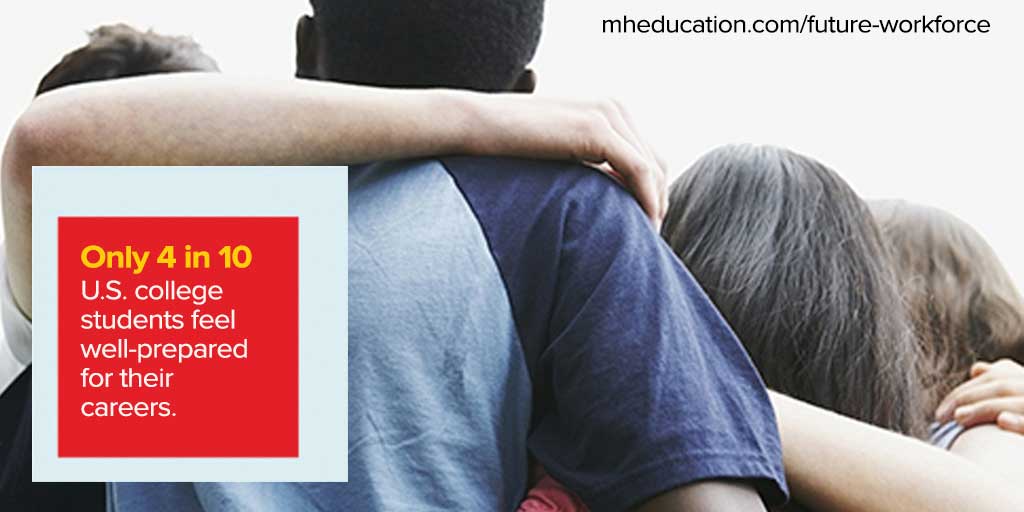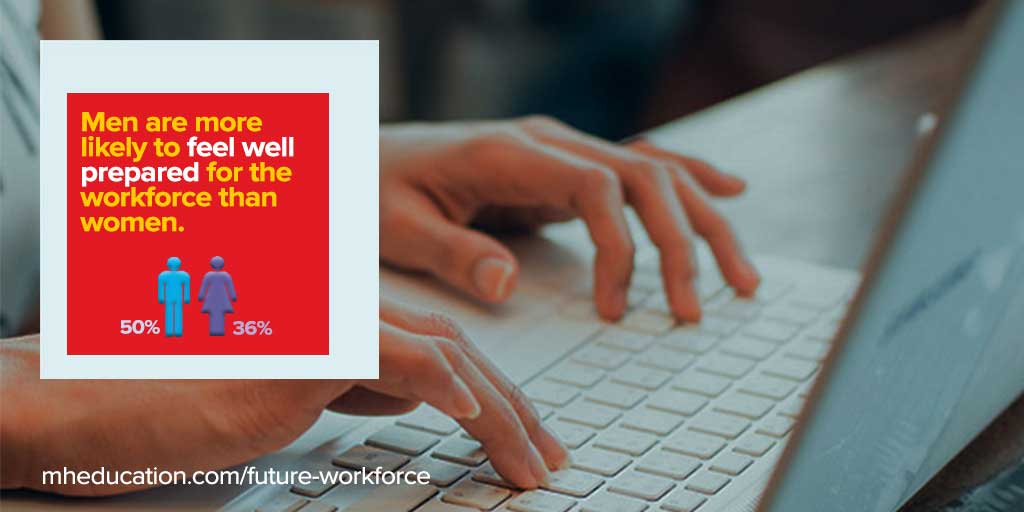New Survey: Only 4 in 10 U.S. College Students Feel Well-Prepared for Their Future Careers; Perceptions of Preparedness Vary Widely By Gender
McGraw-Hill Education survey finds overall perception of career readiness is rising year-over-year
Jun 28, 2018
NEW YORK, June 28, 2018 /PRNewswire/ -- Only 41 percent of U.S. college students overall (and 43 percent of seniors) feel "very" or "extremely" prepared for their future careers, according to the fifth annual McGraw-Hill Education Future Workforce Survey. The percentage is a significant increase from 2017, when 29 percent of students reported feeling very prepared.
Experience the interactive Multichannel News Release here: https://www.multivu.com/players/English/8289051-mcgraw-hill-education-future-workforce-survey-2018/

The 2018 online survey of 1,000 U.S. students was conducted in partnership with MMR Research Associates during March and April 2018. It reflects the perspectives of students from across all regions of the country, different institution types and all years of study. McGraw-Hill Education conducts the study each year to better understand how college students feel about their preparedness for both college and their careers.
The full Future Workforce Survey report is available at: www.mheducation.com/future-workforce.
Highlights from this year's survey:
- College preparedness: A minority of students feel prepared for the time management and financial obligations associated with college, 39 percent and 41 percent, respectively. Only a slim majority feel prepared for social life (51 percent), course load (53 percent) and faculty interactions (53 percent).
- Career preparedness: Men continue to report feeling significantly more prepared for their careers than women. A larger portion of male students (50 percent) say they are "very" or "extremely" prepared for their careers vs. female students (36 percent). Non-traditional students, those who did not enter college directly from high school, also reported significantly higher levels of confidence; half of these students said they felt well-prepared, compared to 34 percent of traditional students.
- Workforce skills: Fewer than half of students report feeling they've gained the critical skills needed to transition to the workforce – such as solving complex problems (43 percent), resume writing (37 percent), interviewing (34 percent) or job searching (31 percent).
- College resources: Students are seeking additional help in preparing for their careers, with 51 percent indicating they would like more internships and professional experiences. Although the majority of colleges offer career services, fewer than half take advantage of them. Those students who do use these services overwhelmingly find them helpful.
- Jobs and employer perceptions: There is a big gap between student and employer perception of preparedness, especially when it comes to professionalism and work ethic. Most notably, 77 percent of students felt confident about their professionalism and work ethic. Conversely, the NACE (National Association of Colleges and Employers) Job Outlook Study recently surveyed employers and found only 43 percent felt recent college graduates were proficient in these areas.
"While it's encouraging that student perception of career readiness is up year-over-year, much more work is required to ensure that students graduate with the confidence, skills and resources needed to enter the workforce," said Bill Okun, president of higher education at McGraw-Hill Education. "To successfully transition from college to employment, students need help applying knowledge in a real-world context and developing the critical thinking and communication skills that they'll need on the job. This is a major area of focus for McGraw-Hill as we work with educators to unlock the potential of each individual learner."
About McGraw-Hill Education
McGraw-Hill Education is a learning science company that delivers personalized learning experiences that help students, parents, educators and professionals drive results. McGraw-Hill Education has offices across North America, India, China, Europe, the Middle East and South America, and makes its learning solutions available in more than 60 languages. Visit us at mheducation.com or find us on Facebook, Instagram, LinkedIn or Twitter.
About MMR Research Associates
MMR Research Associates is a passionate team of forward-thinking experts who provide customized, decision-focused marketing research. Since 1999, clients have relied on the well-tenured team at MMR to design and execute versatile, tailored solutions that shape business direction and inspire confidence.
Contact
Tyler Reed
McGraw-Hill Education
(646) 766-2951
tyler.reed@mheducation.com


SOURCE McGraw-Hill Education
